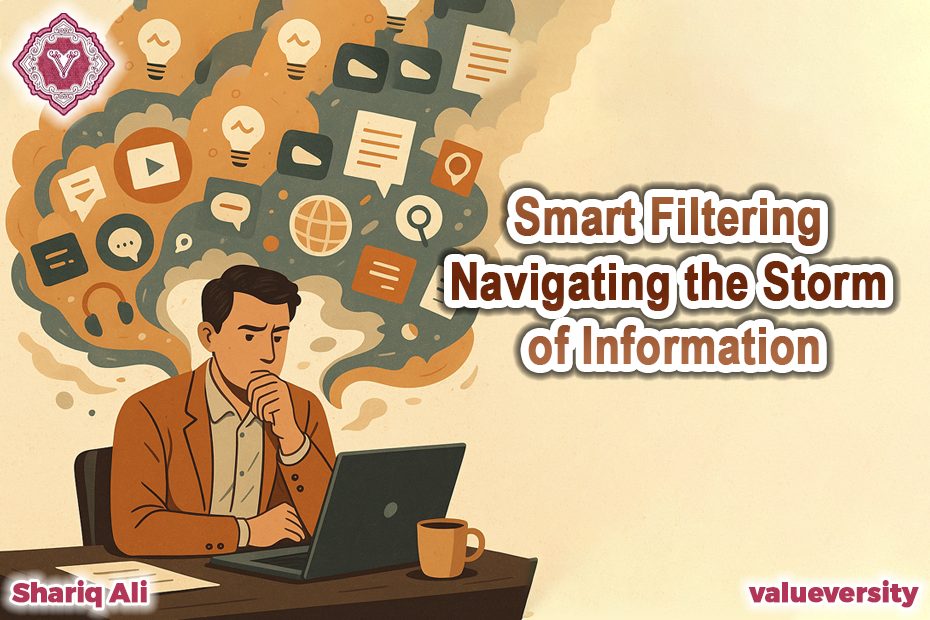Smart Filtering: Navigating the Storm of Information
By: Shariq Ali
Valueversity
Introduction
This article explores how we can wisely find our way through the overwhelming flood of information that surrounds us today.
When human consciousness first awakened, it opened its eyes to a constantly changing universe. The rising and setting of the sun, the falling rain, birds flying across the sky, and the flowing of rivers became the first observations that offered early humans a sense of the world around them. These natural events were not just fascinating to witness, they became a source of learning. Through these observations, humans gradually learned how to survive, how to live with purpose, and how to take their civilization forward.
Our connection to information runs deep. It is not just a matter of intellectual interest or curiosity. Information is directly tied to our survival, our development, our ability to connect with others, and our journey towards self-awareness. As societies became more complex, the nature of information also changed. It became more layered, more diverse, and more demanding.
In earlier times, people gained knowledge through books, oral traditions, and personal experience. The invention of the printing press brought a new speed to the spread of ideas. Newspapers began to circulate, and access to information grew rapidly. In the modern digital world, this pace has turned into a whirlwind. Every moment, we receive information from all directions — through social media, videos, audiobooks, blogs, and many other platforms. We now live in an era where each individual is surrounded by a constant storm of information.
This brings us to an important question. In the middle of this never-ending flood, how can we stay informed without feeling overwhelmed? How do we protect our attention while still gaining what we need to grow?
The answer lies in developing a vital skill — the ability to filter information wisely. What we can call “smart filtering” means learning how to recognise what is truly valuable and what is simply a distraction. This kind of discernment is not only practical, it is essential.
There are two key habits that can help us build this capacity:
First, topical focus.
Give your attention to those subjects that connect directly with the questions and challenges you are facing. If something does not relate to your current goals, it is probably not worth your time right now.
Second, purposeful reading.
Choose content that is clear, concise, and meaningful. Aim for information that helps you move forward, not just content that keeps you busy.
In the past, when people had more time and less access to information, long novels and detailed books were welcomed and enjoyed. But times have changed. Now we have far less time and far more information than ever before. That means our reading habits, learning methods, and even our attention spans must adapt accordingly.
For example, instead of spending hours watching a full-length film, a short twenty-minute documentary might now offer deeper insight in less time. Likewise, short-form videos, podcasts, and focused summaries are becoming extremely useful, especially for people who are trying to learn while doing other things. Whether it’s during a drive, while exercising, or on a long journey, this kind of smart content can make a big difference. Audiobooks and thoughtful news commentaries are especially helpful in this context.
In the end, what truly matters is not how much information we consume, but how wisely we choose it, how well we understand it, and how meaningfully we apply it. In today’s fast-moving world, success belongs to those who can combine knowledge with clarity and purpose. This thoughtful approach to information not only helps us grow as individuals, but also contributes to building a more aware and responsible society.
